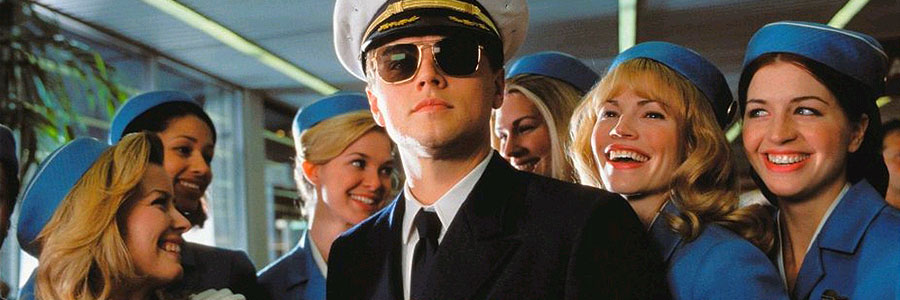
Catch Me If You Can

CATCH ME IF YOU CAN (MOVIE)
Dreamworks
Original release: January 31st, 2003
Running time: 141 minutes
Director: Steven Spielberg
Writer: Jeff Nathanson
Composer: John Williams
Cast: Leonardo DiCaprio, Tom Hanks, Christopher Walken, Martin Sheen, Amy Adams
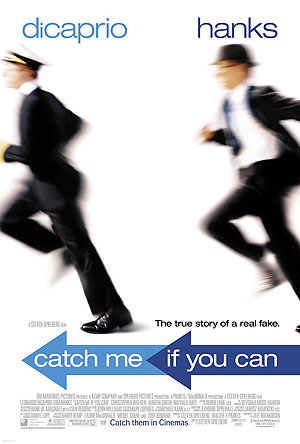
How do you deal with pain? Do you run and hide from it, hoping it will eventually disappear? Or do you confront it in an attempt to beat it and ultimately learn from it? In Steven Spielberg’s Catch Me If You Can, young conman Frank Abagnale is presented with this choice when his seemingly happy parents divorce. Heartbroken, Frank takes the former option and runs away from home, disguising himself variously as an airline pilot, doctor and lawyer in a series of deceptions that made him one of America’s most notorious criminals.
Unlike most crooks, however, Frank is not motivated by money or notoriety, but something much simpler. Frank only wants to reunite his parents, resurrect his old life and return to a scene early in the film where he watches his mother and father happily dancing at Christmas. It’s a perfect scene that brings to mind the work of Norman Rockwell (one of Spielberg’s heroes), but one that can’t ever be repeated. It’s a fantasy, a memory recalled through rose-tinted glasses, and such things can be deceptive and destructive forces.
It’s this message that makes Catch Me If You Can one of Spielberg’s most fascinating films – at least for me. I’ve battled against often crippling shyness my whole life, and while there are undoubtedly bigger crosses to bear, shyness makes everyday living an uncomfortable experience – the simple act of communication becomes a titanic challenge, and it’s easier to escape into fantasy than try to battle through reality. For me, that means an interest in science fiction and comic books, but for Frank it means plunging head-first into the primary colour paradise of the 1960s.
Or, I should say, our collective remembrance of the 60s. Unlike many Spielberg films from the Noughties that attempted to capture grim reality through handheld camerawork and grainy cinematography, Catch Me If You Can revels in its artificiality, trading heavily on 60s iconography to make its point about reality and fantasy.
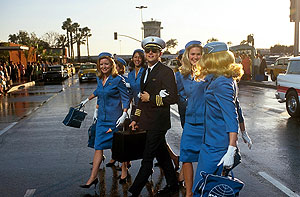
It opens with a Saul Bass-esque title sequence and swings to the sounds of a John Williams score that sounds like a long lost Henry Mancini masterwork. When Frank pops in a record, Dusty Springfield, The Kinks or Frank Sinatra play out, and when he wants to show off, he takes a leaf out of James Bond’s book, zipping around town in a Aston Martin bought, of course, while posing as Ian Fleming. Even the one persistent threat he faces – relentless FBI agent Carl Hanratty – is a pop culture construction, dressed as he is in the dark suit and horn-rim glasses of a million comic book government agents.
This world is as much a lie as one of Frank’s cons, but he falls for its seductive call because of two ‘valuable’ lessons he learns from his father, Frank Abagnale Snr. The first comes in the form of a story, told by Frank Snr at a dinner held in his honour. It tells of two mice that fall into a bucket of cream. One mouse, he explains, gives up and quickly dies. The other, however, fights, swimming through the cream until, eventually, it churns it into butter and climbs out to safety.
The second lesson comes in more direct fashion. Frank and his father need a suit, but the hire shop is closed. When his pleas to the shopkeeper fall on deaf ears, Frank Snr turns to a spot of deception to get his way. Unveiling a necklace, he says to the 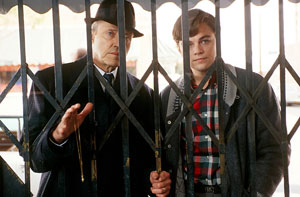 shopkeeper: “Is this yours? I found it out front. It must have slipped right off your neck.” Charmed, the shopkeeper opens the store and Frank and his father get the suit they need.
shopkeeper: “Is this yours? I found it out front. It must have slipped right off your neck.” Charmed, the shopkeeper opens the store and Frank and his father get the suit they need.
These stories offer Frank two very different morals. One preaches the value of hard work and dedication, the other suggests that the things hard work and dedication bring can be bought much more easily – through deception and dazzling appearances. “Why do you think the Yankees always win?” father asks son. “Because they have Mickey Mantle?” “No, because the other team can’t take their eyes off those damn pinstripes.”
Frank merges these two philosophies to set himself on a dangerous path that he thinks will help him realise his dream. But what Frank considers a dream becomes a nightmare for those he encounters. So desperate to force his old life back into being is Frank that he neglects the trail of innocent victims he leaves behind. A stewardess he sleeps with, a prostitute he rips off, a nurse he plans to marry but has to abandon once Hanratty’s net closes in all suffer as a consequence of Frank’s lies. He starts the film a victim, but ends it a villain, so consumed by his own fantasy has he become.
Even his ultimate goal is not served by his devious ways. Frank regularly meets up with his father, who’s being investigated by the IRS. Frank wants to give him some of the money his cons have earned believing that his mother will take his father back if he’s flushed with money. Frank Snr knows better though – a man under investigation 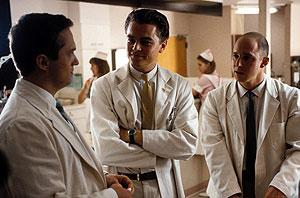 for financial irregularities is best not seen in a fast car or expensive suit. So Frank’s dream remains just that – an ephemeral fantasy he’ll never turn real.
for financial irregularities is best not seen in a fast car or expensive suit. So Frank’s dream remains just that – an ephemeral fantasy he’ll never turn real.
These scenes lend the film a melancholic tone that’s made devastatingly sad when Frank is caught and told of his father’s untimely death. Running to catch a train, Frank Snr slipped on an icy platform and broke his neck. His son’s reaction is one of understandable disbelief, but also guilt. By the end of his life, Frank Snr was struggling to eek out a living. His son off who-knows-where, he died a sad and lonely man, a pale imitation of the triumphant figure we’d seen at the start of the film.
Had Frank not fled into fantasy, this sad fate could have been avoided. He could’ve stayed with his father and helped him create a new life, instead of fleeing in an attempt to force him to recreate his old one. He could’ve confronted his pain and dealt with reality. He could’ve… but he didn’t.
Catch Me If You Can is a film I look towards whenever shyness takes hold and escapism starts to beckon. It’s easy to flee into fantasy, and up to a point it’s an effective defence mechanism. But just as that first mouse found out, the easy route isn’t always the right one. Dedication and hard work, a determination to fight what’s difficult and scary, will be rewarded – you will, eventually, climb out of that bucket.
The pinstripes didn’t matter. Frank was right all along: the Yankees won because they had Mickey Mantle.
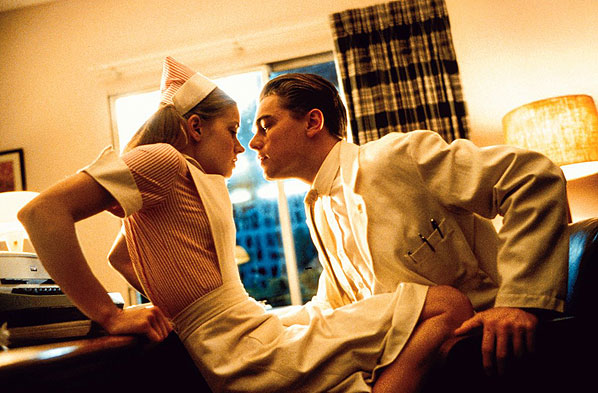

Paul Bullock
Paul fell in love with cinema when dinosaurs ruled the Earth. A childhood viewing of Jurassic Park introduced him to the power and wonder of the silver screen, and after his dreams of directing were shattered by crumbling papier-mâché sets, disobedient action figure actors and a total lack of talent, he quickly turned to writing, thus proving that life does indeed find a way.
When not citing scripture from the apostle Ian Malcolm, Paul also enjoys the films of Billy Wilder, Paul Thomas Anderson, Stanley Kubrick, Frank Capra, Martin Scorsese and Werner Herzog. His favourite film is The Apartment and his favourite apartments are in films. They're much cleaner than his.
Paul can also be found talking nonsense on Twitter and his website Quiet of the Matinee. He works through his addiction to a certain bearded director on From Director Steven Spielberg.
© 2022 STATIC MASS EMPORIUM . All Rights Reserved. Powered by METATEMPUS | creative.timeless.personal. | DISCLAIMER, TERMS & CONDITIONS
HOME | ABOUT | CONTACT | TWITTER | GOOGLE+ | FACEBOOK | TUMBLR | YOUTUBE | RSS FEED
CINEMA REVIEWS | BLU-RAY & DVD | THE EMPORIUM | DOCUMENTARIES | WORLD CINEMA | CULT MOVIES | INDIAN CINEMA | EARLY CINEMA
MOVIE CLASSICS | DECONSTRUCTING CINEMA | SOUNDTRACKS | INTERVIEWS | THE DIRECTOR’S CHAIR | JAPANESE CINEMA





